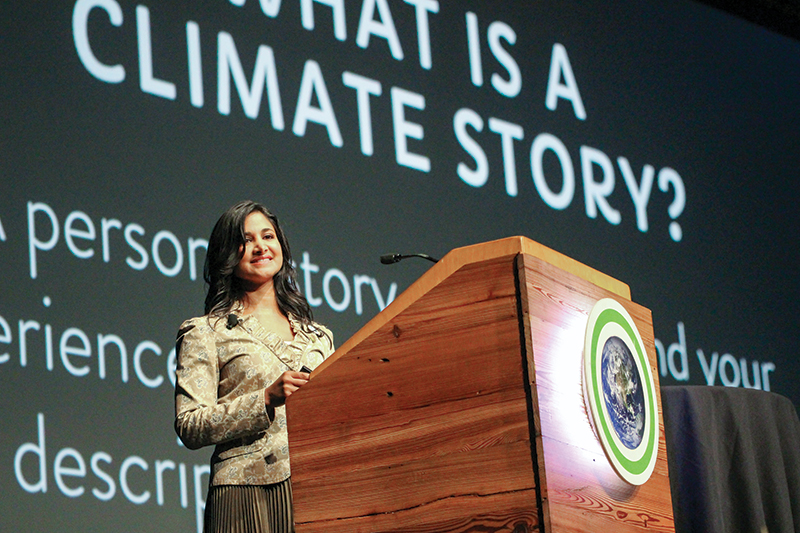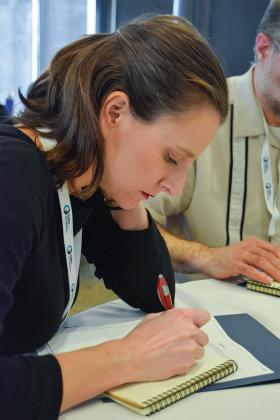Climate Stories: Shifting the Narrative of Climate Change Conversations
Spring
2020
Professional Development - Tips to Build Your Career
Climate Stories: Shifting the Narrative of Climate Change Conversations
Kendra Redmond, Editor
Many people don’t accept that we’re in the midst of a climate crisis. As a physicist, that can be frustrating. We see evidence as the foundation of knowledge and progress, so it’s not surprising that our natural reaction to unconvinced friends or family members is to provide more detailed data, different data, or the same data again, just at a higher volume. But this piling on of evidence often doesn’t work. What then?

The Power of Storytelling
“We know from research that information alone is not enough to move people to change their behavior,” says Jothsna Harris, senior community engagement manager of the nonprofit Climate Generation. “Storytelling is a way to move from the head to heart.”
Climate Generation, founded by the polar explorer Will Steger, aims to empower individuals and their communities to engage in solutions to climate change. A key element of their approach is helping people uncover, articulate, and share personal climate stories—stories that draw in listeners and transform climate change from a distant, complex problem into an issue intricately intertwined with our lives.
“Data, trends, and graphs are only part of the picture,” says Harris. The rest of that picture, the most compelling part of that picture, is the story of how the climate connects us. It’s Malini’s story of how a severe weather event cut off the power to her father’s ventilator. It’s Logan’s story of how a non-native species of fruit fly destroys the raspberry crop in his yard every year.
Facts have a place in climate stories, but that place is usually after listening, learning, and sharing your personal experience. The story establishes commonality, explains Harris, and lays the foundation for a natural transition to the big picture—the increasing number of severe weather events, the disruptive impact of changing weather patterns on farming and food supplies, and the energy cost of new production. After establishing trust and rapport, facts like these are more likely to be received by the listener.
Uncovering Your Climate Story
“Most people think they don’t have a climate story, but they do,” says Harris. The impacts of climate change affect all of us, but it might require some thoughtful brainstorming to arrive at the story you want to share. To help with this, Climate Generation has a series of prompts on their website and a collection of personal stories submitted by others. You might work on this individually or as part of a chapter event or workshop.
Physicists often separate evidence from anecdotes, emotions, and values, but a climate story is the place to pull them all together. Effective climate stories are heartfelt and vulnerable. They weave together personal experiences and climate change, drawing in readers with sensory descriptions and emotion. Putting together this kind of a story might feel a little unnatural at first, but climate change is an emotional issue. Even though you probably learned about climate change intellectually, coming to terms with it can incite feelings of loss, despair, anger, hope, and resolve. This emotional aspect of climate change “is often not acknowledged but most universally resonates with people,” says Harris.
 Sharing Your Climate Story
Sharing Your Climate Story
Once you’ve drafted your climate story, share it with close friends or chapter members. Solicit feedback and spend some time refining your story. The more you share your story, the more empowered you’ll be to talk about the climate crisis in a way that’s authentic and impactful.
When you’re comfortable with your story, consider sharing it broadly. Harris encourages people to send their climate stories to local newspapers and radio stations, share them with policymakers along with specific asks, read them at community outreach events, and employ them in everyday conversation with family and friends. As the 11th Doctor says in season seven, episode seven of Doctor Who, “The soul’s made of stories, not atoms.”
Talk Climate!
For a more in-depth climate story experience, consider attending one of Climate Generation’s upcoming Talk Climate Institutes. The Talk Climate Institute is a two-day intensive workshop in which participants learn new ways to talk about climate change through interactive sessions, personal reflection, storytelling, art, and more. The next Talk Climate Institute is planned for September 2020 in St. Paul, Minnesota, and will be open to the public—keep an eye on climategen.org for details. If you’re interested in hosting a Talk Climate Institute on your campus or in your community, reach out to Climate Generation at info [at] climategen.org.
